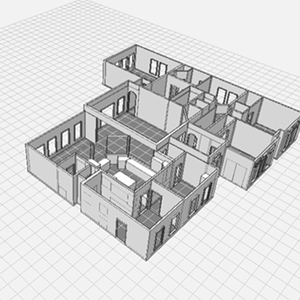*
What’s up with most contractors? I am an experienced(10 years) framer and trim carpenter. I have been in the carpenters union for the last three years so I have experience in commercial work. Why is it so hard to find good and steady work? I read trade journals and keep up with the latest techniques and still can’t find anyone willing to pay a decent wage. Anybody with ideas or suggestions out there?
Discussion Forum
Discussion Forum
Up Next
Video Shorts
Featured Story

Self-installing an HVAC system requires a lot of thought and planning.
Featured Video
How to Install Cable Rail Around Wood-Post CornersHighlights
"I have learned so much thanks to the searchable articles on the FHB website. I can confidently say that I expect to be a life-long subscriber." - M.K.
Fine Homebuilding Magazine
- Home Group
- Antique Trader
- Arts & Crafts Homes
- Bank Note Reporter
- Cabin Life
- Cuisine at Home
- Fine Gardening
- Fine Woodworking
- Green Building Advisor
- Garden Gate
- Horticulture
- Keep Craft Alive
- Log Home Living
- Military Trader/Vehicles
- Numismatic News
- Numismaster
- Old Cars Weekly
- Old House Journal
- Period Homes
- Popular Woodworking
- Script
- ShopNotes
- Sports Collectors Digest
- Threads
- Timber Home Living
- Traditional Building
- Woodsmith
- World Coin News
- Writer's Digest


















Replies
*
Daniel,
By now, (10 years) you should have a good idea what tasks flip your switch. What part or job, skill, ect, gets you outta bed raring to go?
Define and fine tune it. Then find the finest G.C. out there providing that service. A G.C. will pay for a tradesman who's gonna make him/her money and expand his reputation.
The age of generalities is over. You can't be a do-everything Carpenter. Those guys get scale and get laid off. This is the age of the specialist.
*Daniel,hope you don't mind giving specifics. might help to answer your question.1) how old are you?2) where do you live?3) for you, how many hours a week/month/year is 'steady'?4) for you, what is a decent wage?5) are you mobile? are you tied down?6) do you want to manage projects?7) do you have some other kind of goal or position you see yourself fulfilling?I'm sorry if I'm being too forward here but I feel that your real question might not be how do I get steady work at a decent wage but instead you want to define what the next step of your carpentering is going to be or is 'supposed' to be. am I off base?like what I think Mark basically is saying: what is your goal or what is your lack of goal.GO
*Hey Dan, been w/ G.C. over 10 years, I'll disagree w/ Mark, you'll need to possess knowledge of most things, they push subs left and right, plenty of loose ends need tying up. "Can" the trade magazines and stick with proven methods till you get a chance to analyze them, and see if they are really practical, Our whole labor crew is spanish, and speak nothing but spanish, I'm learning, and I'm also seeing want-adds for bi-lingual carpenters.
*Sorry Mark but I have to disagree as well. The people I use need to be versed in a whole lot of areas in the trade. For specialists I call in my subs. The more they know the more they can earn.
*Sorry guys,I like people well rounded but the reality is a spider-like truss setter rarely makes a good stairmaker. There are gonna be times where he needs a helper for that truss job and there will be times when the guy who's speciality, or strong point is building stairs, will need a hand. (Truss setter)I will always hire those two guys first, in fact I'll wait to hire those two, rather than hire two, know-it-alls, do-it-alls.I agree completely that it is invauluable to have a full plate of experience and possess knowledge of every phase and method, but you'll never make more than scale and will always live under the threat of a layoff if you don't become invauluable in a specialty.
*Mark - I think you make a good point, that specialization helps a worker earn more money, earlier in their career. But if you take that resoning one step farther, would you agree that specialization is what makes that worker expendable when the industry changes, and there is less demand for their specialty? Or what about the your truss spider who makes the company lots of money framing because he throws it up there faster than hell, but when it comes time to trim, his abilities aren't up to industry standards? Would you agree that fewer homes today have custom staircases, or cabinetry than 50 years ago? Is there as much demand for those specialists as there was 50 years ago? What about controll? How do you compensate when that specialized employee, or sub, breaks their leg and can't get that roof framed before winter? I know these are all simplified examples, but I can definately see pros and cons to each side of this issue.Interesting topic, since our industry is moving increasingly toward specialization.
*All good examples Jim.And ones not only the guy in charge should think about, but the employee him/herself.For a company of homebuilders, I think it boils down to team-work.Say Jim's really good at roof framing, yet if Stan, the guy who's really good at stairs is sick, Jim can cover. In other words, aquire the skills to perform each specialty in a proficient manner, yet be the one who leads when it comes time to do the one thing you do better than anyone else.For the business owner, to encourage, insist that all members of your crew work with each other to widen their skills. That way, work goes on inspite of an illness or injury. For the tradesperson, don't paint yourself into a skill corner. I've seen good finish carpenters become "too good" in their mind to stand-up a wall and they usually go bye-bye. Real value, as a skilled employee, is one who can do most everything to industry standards, but kicks ass in one specialized area. Whether that be framing, finish, foundation layout, doesn't matter, you still must have the skills to fill in everywhere. If you wish to be a stair-builder and nothing else, your choices are; work for a stair-builder and hope he's a good businessman or become a businessman who's provides service as a stairbuilder.I think the days of working for one company, all your life, whether it be IBM, or ABC Construction, are long gone. Tradespeople have to start thinking for themselves for matters of job security and in the trades, I think that means developing a specialty you become known for.Good thoughts.........hey, Jim, still enjoying that purty picture!
*Where is it you are looking? In the D.C.metro area, the construction industry is booming. Really good people are earning @ $25 per hour. That's what I pay my guys.-JBW
*Are they your full time employees with taxes taken and full workmans comp. Or are they subcontracting to you at your prices?
*border brothers. bluntly.brian